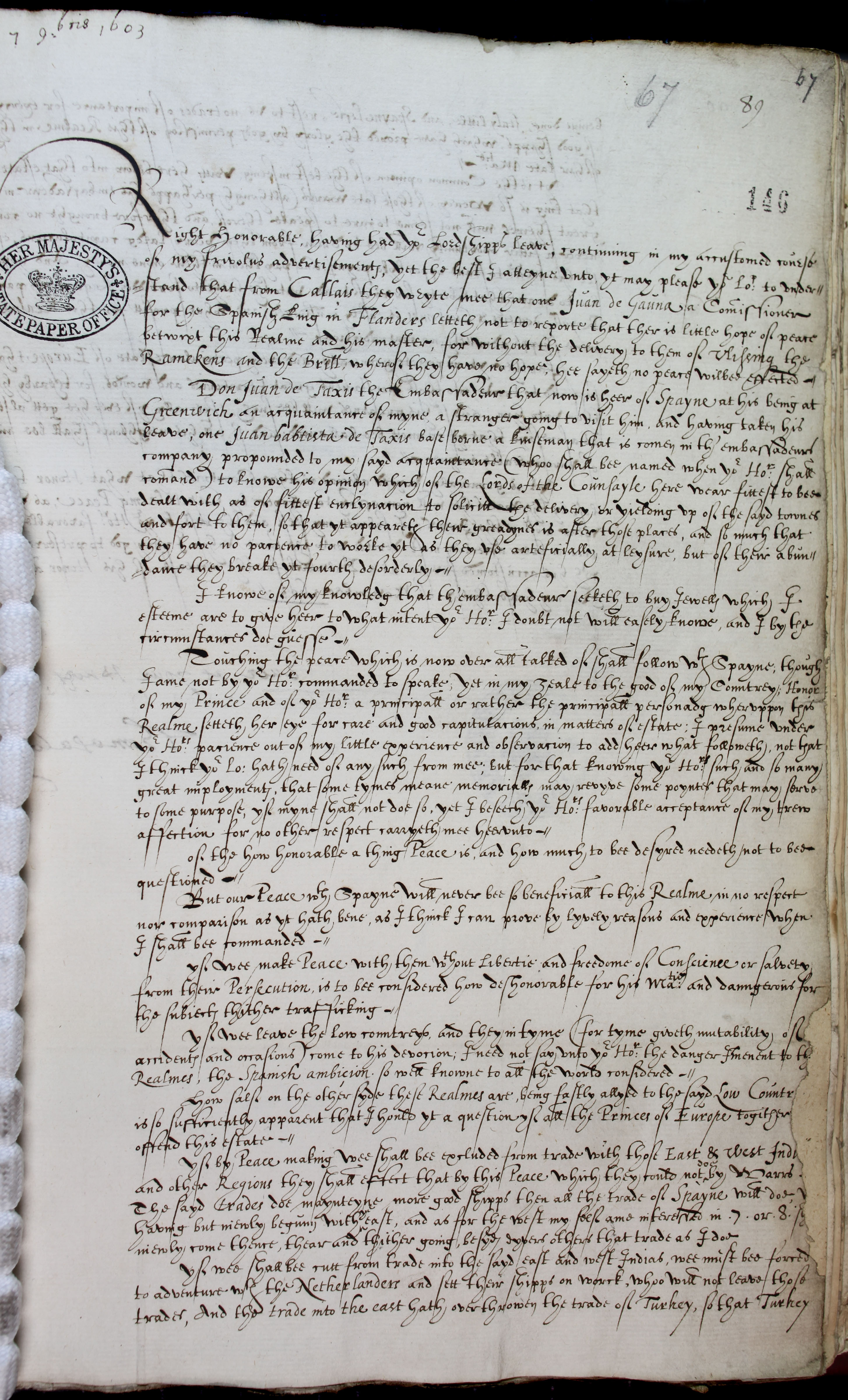
Extract from letter from Thomas Alabaster to Robert Cecil on peace with Spain, 7 November 1603 (catalogue ref: SP 14/4 ff.146r).
The main barriers to peace are focused on here, highlighting important foreign policy issues at the start of the reign of James I.
Transcript
Right Honorable, having had your Lordship’s leave, continuing in my accustomed course of my frivolous advertisements, yet best I attain unto it may please your Lordship to understand that from Calais they write me that one Juan de Guana, a Commissioner for the Spanish King in Flanders lets not to report that there is little hope of peace betwixt this Realm and his master, for without the delivery to them of Flushing, the Ramekens and the Brille [fortresses] whereof they have no hope he sayeth no peace will be effected.
Don Juan de Faxis, the Ambassador that now is here of [from] Spain at his being at Greenwich, an acquaintance of mine, a stranger going to visit him and having taken his leave, one Juan Babtista de Taxis base borne a kinsman that is come in the ambassador’s company propounded to my said acquaintance (Who shall be named when your Honour shall command) to know his opinion which of the Lords of the Council here were fittest to be dealt with as of fittest inclination to solicit the delivery or yielding up of the said towns and fort to them, so that it appears there greediness is after those places, and so much that they have no patience to work it as they use artificially at leisure, but of their abundance they break it fourth disorderly.
I know of my knowledge that the ambassador seeks to buy jewels which I esteem are to give here to what intent your Honour I doubt not will easily know, and I by the circumstances do guess.
Touching the peace which is now over all talked of shall follow with Spain, though I am not by your Honour’s commanded to speak, yet in my zeal to the good of my country’s honour of my Prince and of your Honour a principal or rather the principal personage whereupon this Realm sets her eye for care and good capitulations in matters of estate: I presume under your Honour’s patience out of my little experience and observation to add here what follows, not that I think your Lord hath need of any such from me; but for that knowing your Honour’s such and so many great employments that sometimes mean memorials may revive some points that may serve to some purpose if mine shall not do so yet I beseech your Honours favourable acceptance of my true assertion for no other respect carries me hereunto of the how honourable a thing peace is, and how much to be desired needs not to be questioned.
But our peace with Spain will never be so beneficial to this realm in no respect nor comparison as it hath been as I think I can prove by lively reasons and experience when I shall be commanded.
If we make peace with them without liberty and freedom of Conscience or safety from their persecution, is to be considered how dishonourable for his Majesty and dangerous for the subjects thither trafficking [trading]
If we leave the Low countries and they in time (for time giveth mutability [liability to change] of accidents and occasions) come to his devotion, I need not say unto your Honour the danger imminent to the realms, the Spanish ambition so well known to all the world considered
How sails on the other side these realms are being fastly [closely] allied to the said Low Country is so sufficiently apparent that I hold it a question if all the princes of Europe together offend this estate.
If by peace making we shall be excluded from trade with those East & West Indies and other regions they shall effect that by this peace which they could not do by wars. The said trades do maintain more good ships then all the trade of Spain will do having but newly beginning with the east and as for the west, myself am interested in 7 or 8 [?] newly come thence there and thither going beside divers others that trade as I do
If we shall be cut from trade into the said East and West Indies, we must be forced to adventure with the Netherlanders and set their ships on work, who will not leave those trades, and the trade into the east hath overthrown the trade of Turkey…
